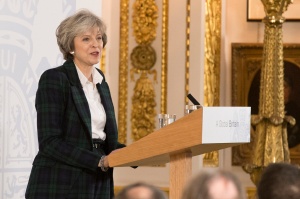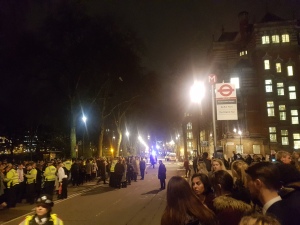 Good politicians learn from history’s mistakes, great politicians make sure those mistakes aren’t repeated. With trouble on the horizon, Theresa May’s announcement of a General Election shows she won’t be repeating the mistakes of Gordon Brown, and Jim Callaghan of missing the chance to go to the country.
Good politicians learn from history’s mistakes, great politicians make sure those mistakes aren’t repeated. With trouble on the horizon, Theresa May’s announcement of a General Election shows she won’t be repeating the mistakes of Gordon Brown, and Jim Callaghan of missing the chance to go to the country.
It could be a perfect chance for a strong opposition to challenge a party pursing a divisive hard-line policy. Instead May’s Conservatives are 20 points ahead, Jeremy Corbyn’s Labour at a historic low-point, and there is next to no chance of him forming the next Government.
In a strategic swoop, May will shoot Labour’s fox. By July he’ll be gone, and the Prime Minister will have a 50-70 strong majority. With a Liberal Democrat resurgence likely in the South West, and no prospect of either party meaningfully gaining seats in Scotland, reports of a 100+ majority for the Conservatives are likely to be strongly overegged.
From there, Labour will have five years to rebuild, get a leader with a solid team behind him, and could really challenge in 2022, especially if Brexit goes as badly as some fear.
It didn’t have to be this way. Corbyn was the left’s Ronnie Rosenthal moment. Huge excitement at the prospect of an open goal being put in, before realising that with the goal gaping wide, the man’s impotent. Nobody from the left will be allowed to play up-front again, instead they’ll be Left Back on the back benches.
The problems aren’t his policies, as proven in polling over the last few weeks, many are popular. Universal free school meals, good idea. Bumping up the carer’s allowance, likewise. All on top of previously established plans. His chancellor, John McDonnell’s economic strategy and ideas have been a breath of fresh air to a stale status quo, but it’s all rather pointless.
The problem is Jeremy’s team is ineffective, he’s an incapable media performer, with the strategic mind of General Haig at the Somme. Sadly for Labour MPs, they’ll be the ones playing the role of the honest Tommy cannon fodder in June.
For the media, his team take ages to respond to enquiries and request. You would have thought that a party on an election footing would have a statement ready to go if Theresa May called an election. Apparently not. As a course mate pointed out, our shorthand tutor managed to get a statement out before the British leader of the opposition did.
On Brexit, the party makes dishwater look clear. Dipping a toe in the water, before jumping out again isn’t a way to sell an idea to people. It’s at best, confusing, and at worse, looks as though you’re selling an idea you don’t believe in.
Policies are all well and good, but unless they’re fronted up effectively, they’re useless. A reason why I suspect the Liberal Democrats won’t do all that well is that they’re fronted by the equivalent of a Lancashire parish reverend.
The sad thing is, most of his backers could never have envisaged that things would go this badly wrong for him. Hostile MPs haven’t helped, but Jeremy’s hardly lived up to any sort of promise many had.
One plus point is that it will give the next Labour leader the chance to regain credibility. I’d imagine there’d be a 10-point bounce from a new leader. However that’s one of few plus points. This will be the last election fought on current boundary guidelines. The extra two years will give May time to smooth over any Brexit difficulties. A larger majority will give her a freer hand to do as she wishes in Westminster, before and after any EU negotiations.
If the 2015 result was galling, 2017’s will be worse. While I’d always back the Labour Party to be best chance of genuine progress in Britain, after the last two years, it’s difficult to see how others who weren’t convinced will be attracted to the cause. This could be the starting pistol of a very difficult five years. 20 years on from one of their biggest triumphs, Labour could be starting back at square one.

 Fate never checks your diary. But to be honest, if it did and had asked me when I’d have been happy to be caught up in a terrorist attack, I think we’d have struggled to fix a date. For a period on Wednesday, I wondered if I was moments from being killed.
Fate never checks your diary. But to be honest, if it did and had asked me when I’d have been happy to be caught up in a terrorist attack, I think we’d have struggled to fix a date. For a period on Wednesday, I wondered if I was moments from being killed.

 I’m no E.U apologist. For a while leading up this vote I’ve been firmly on the fence glancing occasionally at either side to which I might commit. However, over the last week I’ve had my
I’m no E.U apologist. For a while leading up this vote I’ve been firmly on the fence glancing occasionally at either side to which I might commit. However, over the last week I’ve had my 
